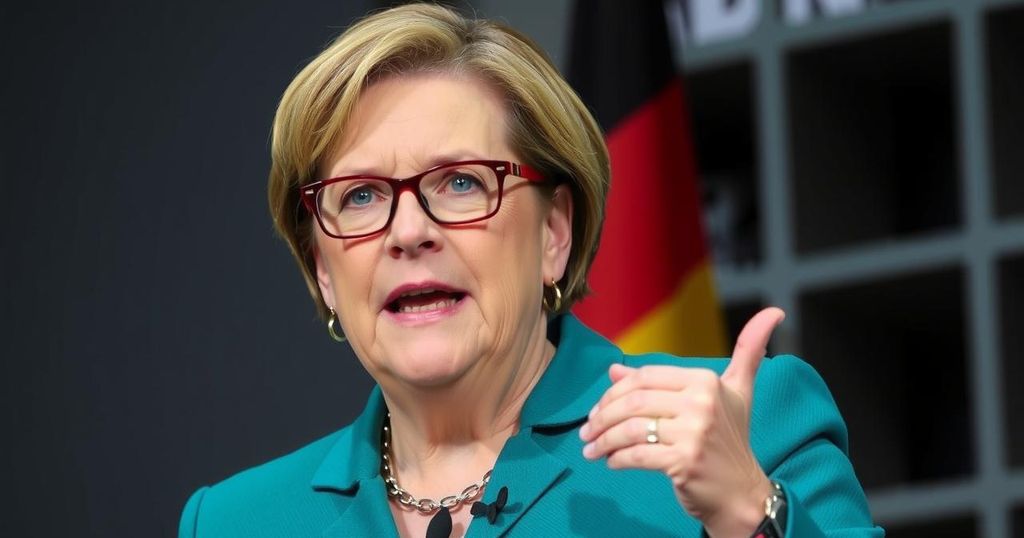Politics
AFRICA, ARGENTINA, BUN, BUNDESTAG, CHRISTIAN DEMOCRATIC UNION, CHRISTIAN LINDNER, COALITION GOVERNMENT, DEFENSE SPENDING, DEMONSTRATIONS, EUROPE, EUROPEAN UNION, FRANCE, FRANCE SCHOLZ, FREE DEMOCRATS, FRIEDRICH MERZ, GERMANY, GOVERNMENT, GREENS, ICJ, ITALY, LINDNER, MERZ, OLAF SCHOLZ, SCHOLZ, SENEGAL, SOCIAL DEMOCRATS, SOUTH AMERICA, SPD
Marcus Li
0 Comments
Chancellor Scholz Loses Confidence Vote, Germany Faces Snap Elections
Chancellor Olaf Scholz has lost a confidence vote in parliament, prompting elections on February 23, seven months ahead of schedule. His coalition collapsed after internal conflict with the Free Democrats. Polls indicate a conservative lead, complicating the political balance in Germany as Scholz attempts to frame the election as a choice between investment and austerity.
German Chancellor Olaf Scholz has faced a significant political setback, losing a confidence vote in the Bundestag, which has led to the announcement of snap elections set for February 23, seven months earlier than originally anticipated. This vote followed the collapse of Scholz’s coalition, primarily resulting from internal strife within his governing coalition of three political parties. Scholz garnered the support of 207 lawmakers against 394 votes opposing him, alongside 116 abstentions, thus failing to secure the necessary majority of 367 votes needed for confidence.
The fallout from this decision sees Scholz’s political future in jeopardy, as he seeks to portray the upcoming elections as a pivotal opportunity for voters to select a new direction for the country. He has emphasized a contrast between his vision of future growth and the fiscal austerity he attributes to his opponents, particularly the conservative Christian Democratic Union, led by Friedrich Merz. The existing government will remain in operation without parliamentary support until a new coalition is formed, yet Scholz has proposed immediate measures that include €11 billion in tax cuts and increased child benefits.
Scholz’s administration became tenuous following the November dismissal of Finance Minister Christian Lindner, which prompted Lindner’s pro-business Free Democrats to withdraw from the coalition. As a consequence, the Social Democrats (SPD) and the Greens now lack a parliamentary majority, complicating the political landscape in Germany. Polls indicate that the conservatives possess a solid lead over the SPD, while the far-right Alternative for Germany (AfD) is also drawing voter support, further challenging traditional political alignments and prospects for stable governance.
In light of the current electoral climate, Scholz’s proposals aim to address immediate economic concerns, enhancing his appeal to the electorate while contending with critiques regarding fiscal management and national security commitments in the wake of geopolitical tensions.
As the country approaches the election date, the overarching implications of this political shift will shape not only Germany’s domestic policies but also its position within the broader European context.
The political landscape in Germany has shifted significantly following the loss of confidence by Chancellor Olaf Scholz. The situation arose from instability within his coalition government composed of the Social Democrats, Greens, and the Free Democrats. Following prolonged disagreements over fiscal policy, Scholz’s coalition disintegrated, leading to an early election announcement. This political crisis highlights the challenges facing Germany, the largest economy in Europe, amid rising tensions and calls for financial reform.
In summary, Chancellor Olaf Scholz’s loss of a parliamentary confidence vote has triggered an unexpected election set for February 23, following the collapse of his coalition government. The future political landscape of Germany is precarious, with a potential shift toward conservative leadership and emerging challenges posed by the far-right. Scholz’s vision of investment and growth will be placed against a backdrop of austerity as the electorate prepares to weigh their options in the forthcoming elections.
Original Source: www.aljazeera.com




Post Comment